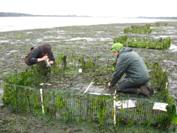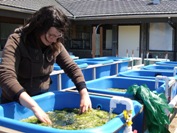Sea-oh McConville
Chemeketa Community College
Project: A Laboratory and field study of the interactions between macroalgae and eelgrass in Oregon’s estuaries.
Summary: The COSEE Pacific Partnerships PRIME internship was overseen by Margot-Hessing-Lewis, a PhD in Dr. Sally Hacker’s lab at Oregon State University. I was responsible for a component of her ongoing research assessing the affects of macroalgae blooms on eelgrass, Zostera marina, in Pacific Northwest estuaries. In particular, I monitored and maintained twenty mesocosms that replicated field experiments; specifically looking at productivity of seagrass under different sets of conditions (increased nutrient availability in the water column, and presence of macroalgae). I also participated in fieldwork at multiple sites where eelgrass monitoring has been ongoing for the last 4 years.
 My Experience: This opportunity is probably one of the best of my undergraduate and most certainly my community college experiences. Through it I was able to learn practical and technological skills in experimentation, to delve into a very specific area of estuarine ecology, to make connections in the scientific community, to have a great summer that related to my course of study, and most importantly, to spend time finding out whether or not this is an area that would be enjoyable as a long-term field of study and work.
This kind of program is vital to community college students who are interested in marine biology for a variety of reasons: forming connections with researchers, organizations, and future mentors; gaining experience in a field with a good deal of physical and technological nuances to grasp; finding out whether one is suited to research, field work, and marine biology; and most importantly, delving into a more advanced level or research before moving onto university. This internship has provided a veritable cornucopia of experiences and skills that are both surprising and incredibly enlightening. I certainly think that any student interested in further study of marine biology will benefit both educationally and professionally by participating in a PRIME internship, as I definitely have!
Mentors: Margot Hessing-Lewis, Ph.D. student, and Dr. Sally Hacker, Associate Professor, Zoology, Oregon State University
|










